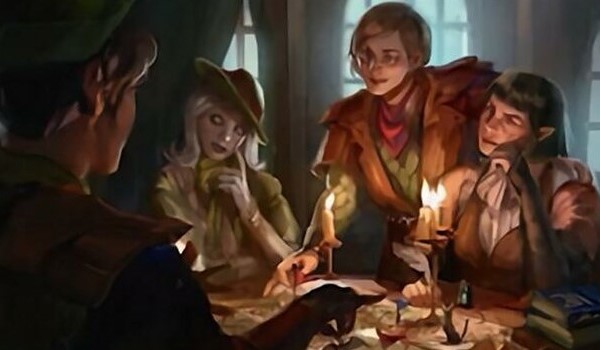Are you a Quiet Speculation member?
If not, now is a perfect time to join up! Our powerful tools, breaking-news analysis, and exclusive Discord channel will make sure you stay up to date and ahead of the curve.
On Monday morning Bank of America (BofA) double-downgraded Wizards of the Coast's parent company Hasbro's (HAS) stock to "underperform" from "buy." The move was announced following what BofA called a "deep dive" on Magic: The Gathering.
BofA slashed their price target for HAS to $42 per share from $72, considerably lower than Friday's closing price of $63.41, implying significant risk to investors. According to the report, Magic generates 15% of Hasbro's total revenue and as much as 35% of EBITDA.
In a quote from the report widely shared among the Magic community, one of the report's authors noted:
We've spoken with several players, collectors, distributors and local games stores and have become aware of growing frustration. The primary concern is that Hasbro has been overproducing Magic cards which has propped up Hasbro’s recent results but is destroying the long-term value of the brand.
The report echoed some legitimate concerns expressed by the Magic community in the last two years. In the immediate aftermath of the report, several commentators, and numerous Magic fans on social media, were quick to say the equivalent of "I told you so." Not all commentators took the BofA report and downgrade at face value. Rich Stein over at Hipsters of the Coast published an analysis of the BofA report critical not only of its conclusions but of what it left out of the report.
The Quiet Speculation Take
Though long known as a leading source for Magic finance, Quiet Speculation is more than just finance, and our team of content creators all approach Magic from differing perspectives. Compiled here are the team's takes on the Hasbro stock situation, and some possible ways forward for Wizards.
Sigmund Ausfresser

There are two schools of thought regarding BofA's market call, and their "deep dive" analysis of Magic.
On one hand, many players feel justified that Wall Street is finally taking notice of the missteps Hasbro, the parent company of Wizards of the Coast, has made over the past 12-18 months. Social media has been particularly vocal about the glut of product releases, massive waves of reprints, and general fatigue players are experiencing with Magic. Because players can't keep up with all these releases and their resources are limited, the BofA analyst indicates excess supply and unprofitable releases have damaged Magic's distribution network, leading to a reduction in offerings at many retailers. It also pokes holes in the integrity of Magic's secondary market. This is not a new story.
On the other hand, some players are challenging this analyst's write-up, calling it shallow and narrow-sighted. For example, some have stated that this analysis fails to touch on the explosive growth that Magic Arena, the online platform, has experienced over the past couple of years. I, myself, play the vast majority of my Magic on Arena now because of its convenience… that being said, I also don't spend a dime on the platform, so it does beg the question of what kind of revenue stream potential the application offers. The highlights from the downgrade piece also fail to talk about the larger context, such as a weaker macro environment and overall economic recession. Naturally, if people are on a budget and watching their spending, luxury purchases such as Magic cards may reduce temporarily.
Nonetheless, the message should be loud and clear to Hasbro. Players are not happy. The problem is, I don't know what they can actually do about this information. A vocal portion of the player population has been unhappy for years now, yet the game remains as strong and healthy as ever.
In my opinion, this won't really change much. Business as usual is what I anticipate, with zero acknowledgment of this analyst downgrade. Large publicly traded companies have to deal with analyst reports all the time, and this one is no different. Do I hope that Wizards makes some adjustments to their product release schedule going forward? Of course. Unfortunately, I don't expect any changes to occur, at least not in the short term.
As for the health of Magic in general? I think the secondary market is taking a much-needed break from the massive growth it experienced over the past few years. Magic isn't going anywhere, but neither are falling prices (especially on older cards). It's one of a handful of reasons why I sold most of my collection in Las Vegas. Because of that move, I can happily say I won't lose any sleep over this recent development. If you are concerned about this analyst report and are in the camp that this is a bad omen for Magic, perhaps consider following suit and cutting back on your own collection? There are many inexpensive ways to enjoy the game, so there's little need to keep the expensive stuff.
David Schumann

What They Got Right
There is a large consensus on both the Quiet Speculation Discord server as well as on a lot of the Magic groups across various social media platforms that Wizards, whether at the behest of Hasbro or not, has gone overboard with their recent product release strategy. The term “wallet fatigue” has been frequently thrown around, and many players are backing off buying much of the new product Wizards has pushed off their printing presses lately. The idea of not purchasing a given release was a nigh unheard-of concept in the community until very recently.
On top of this wallet fatigue, There's been widespread outrage regarding Magic 30th Anniversary Edition. These are non-tournament legal cards priced at $999 for four randomized packs. The product hasn't even been released yet, so its success or failure has yet to be proven, but the attitude surrounding it is almost exclusively negative. Let's be real: even if Wizards manages to sell just a few of these, they're likely to wind up in the black profit-wise, so there's no way it ends up a failure... in the short-term. Shaking player confidence, though, has far-reaching costs as well.
Lastly, the constant barrage of new products has really harmed many local game stores (LGSs). These retailers are often required to order products well in advance, and if the hype of their new inventory or even “soon to be” inventory gets overshadowed by the next product announcement, they can be left holding a lot of undesirable inventory. This could easily be validated by contacting a large number of LGS owners and asking about stale inventory.
What BofA Got Wrong
“The increased supply has crashed secondary market prices”, is a damning statement that unfortunately, does not include any evidence I can see to back itself up. If one looks up set Expected Value(EV) we can see that the most recent sets have EVs well in line with what we have seen historically throughout Magic's recent history prior to Wizards' decision to run their printers at warp speed. If we compare sets that came out in 2013-2016 to newer sets we should expect to see a much lower EV of any given newer set if this statement were true.
| Year | Set | EV | Year | Set | EV | |
| 2013 | Theros | $79.22 | 2020 | Theros Beyond Death | $132.77 | |
| 2013 | Born of the Gods | $46.10 | 2020 | Ikoria: Lair of Behemoths | $106.71 | |
| 2014 | Journey into Nyx | $93.30 | 2020 | Zendikar Rising | $73.13 | |
| 2014 | Khans of Tarkir | $124.87 | 2021 | Kaldheim | $84.14 | |
| 2015 | Fate Reforged | $58.86 | 2021 | Strixhaven: School of Mages | $74.99 | |
| 2015 | Dragons of Tarkir | $80.61 | 2021 | D&D: Adventures in the Forgotten Realms | $63.86 | |
| 2015 | Battle for Zendikar | $72.46 | 2021 | Innistrad: Midnight Hunt* | $79.24 | |
| 2016 | Oath of the Gatewatch | $99.63 | 2021 | Innistrad: Crimson Vow* | $65.56 | |
| Average | $81.88 | Average | $85.05 |
While this data is not conclusive based on a random year sampling, one thing it does indicate is that the value of the singles has not crashed. You could make an argument that the trend since 2021 does appear to be negative; however, the EV for the most recent sets are; $97.93 (Kamigawa: Neon Dynasty), $68.29 (Streets of New Capenna), and $84.07 (Dominaria United) all of which seems on par with what we have seen of set EV historically.
It is also critical to understand that to most of the Magic community the “secondary market” is all the single cards opened from sealed products. Wizards, in almost all instances, sells sealed products. Thus, the secondary singles market only occurs because people buy those sealed products and open them. This means Wizards makes its profits upfront regardless of what happens to the secondary singles market. If this secondary singles market had indeed crashed, then Wizards would see a massive drop off in purchases of sealed product as stores would choose not to reorder boxes because players were opting not to purchase enough singles to justify opening the boxes themselves.
I would also argue that a “deep dive” analysis should include significantly more input than that from “several players, collectors, distributors, and local games stores”. One would likely need to run polls in multiple established groups of each of those categories. I would expect that a growing frustration and comments of the aforementioned “wallet fatigue” would be rampant, but that kind of diligence should be required before issuing a major downgrade from a large institution's investor unit.
Lastly, I want to cover the following statement: “Not only is the price excessively high, but the set also includes Reserved List cards which Hasbro had promised to never reprint.” It would also be quite damning if it were true. As almost every Magic player knows, Magic 30th Anniversary Edition does not in fact include Reserved List cards; it includes non-tournament legal cards that are far less functional due to their lack of legality. In all fairness, that product doesn't actually affect tournament legal cards in any way other than instilling fear into some who think that Wizards may go further with toeing the line of the Reserved List and cause people to sell cards which will cause prices to drop.
In the end, I do agree that Wizards appears to be putting short-term profits over the long-term sustainability of Magic itself. It seems like a questionable assumption to believe that should Magic start to see negative growth Wizards would not pump the breaks on their current strategy and revert more towards what has proven successful over all these years.
David Ernenwein

When analyzing a source, it is important to keep that source's purpose and perspective in mind. Bank of America (BofA) had an agenda, and unless that agenda fully aligns with your own, don't assume their words mean what you want them to mean. In downgrading Hasbro's stock, BofA's goal is not the preservation of Magic as a game. They want to preserve it as an investment opportunity. While I agree with the substance of their criticisms of Hasbro policy, the conclusion I reach is that they're overextending the game and driving away players which could collapse the game in the long-term. BofA's conclusion is that Wizards is devaluing the collectability and therefore the investibility of Magic, which makes it an unattractive stock option. BofA wants card prices higher and cards scarcer, whereas players want prices lower.
Whether this will translate into action on Hasbro's part is impossible to say. Corporate boards tend to be more responsive to stock prices than customer discontent, so it is possible that this downgrade will give Hasbro pause. However, if they do change policy, it would be to placate their investors and shareholders, not players. Furthermore, the money they're making off their current policies including the ones BofA is criticizing may be enough for them to ignore BofA entirely. In either case, this stock drama is not actually a win for players.
Joe "Beardy" Mauri

Hasbro has finally done it. They've crossed a line and are getting pushback in the form of a double downgrade from BofA. With Magic's 30th Anniversary, it's important to consider Hasbro's recent strategy and what 30 more years of Magic could look like.
There is absolutely no chance that Magic lasts another 30 years if they continue to pump out product as they have been. I was there for Fallen Empires and Chronicles; those were dark times for Magic. It makes me wonder if Hasbro missed the industry history lesson that day. Too much product can have a tremendous chilling effect on future growth. Not only that, but they are also continuing to make a low-quality product in many instances. Cards come pre-damaged, and foils are the worst they have ever been.
The Hipsters of The Coast article covering this BofA forecast suggests not enough research was done for what could be called a "deep dive," but then goes on to mention several "strong concerns." Well, what is it? Are these concerns, or "strong concerns?" If your product at the end of the day is "making cards," and you produce low-quality cards, that is a huge issue, not a minor one. Once you wrap that into everything else, I see some big red flags for the future. Wizards once knew how to manage the future of the game to grow it steadily year over year, and did so successfully for decades. Now, Hasbro is forcing the goose to lay golden eggs until it dies. The former strategy was good for both players and investors. The latter is bad for both groups, and for the longterm health of the game.
Which would you bet on?
Adam Cohen

Players in recent years have complained about an unending spoiler season and product fatigue. This can largely be attributed to the accelerated release of supplemental products. With the shift to Commander as Wizards’ primary focus, instead of one Commander product released each year, 2020 introduced three, followed by five in 2021 and 2022. It’s unlikely this will stop anytime soon.
To make matters worse, several of the Commander set cards are not found in the Commander product itself. Instead, more desirable inclusions are hidden away in Collector Boosters and Set Boosters, more expensive premium products, which offer higher chances of foil and alternate art versions of cards as part of Wizard’s Project Booster Fun. In reality, Booster Fun is capitalizing on interest in foil and alternate art cards to the detriment of both the product and player.
Secret Lairs have exacerbated the special printing issue as well. Seven Secret Lairs came out in 2019, followed by 26 in 2020, and 46 in 2021. At the time of this writing, just under 50 Secret Lairs have come out so far in 2022, with the total projected to surpass 60 before the end of the year. When foils and alternate arts were scarcely used promotional pieces, collectors found them to be highly enticing. Now that everything is special, nothing is.
Moreover, with these supplemental products acting as vehicles for reprints, anything not on the Reserve List is fair game. As Wizards continues to go back to this well, card value and reprint equity is quickly diminishing. While it’s offering Hasbro short-term gains, it’s going to keep getting more difficult to get players excited about the seventh reprint of Birds of Paradise in three years. My recommendation is to take a breather, turn off the firehose, and allow the products to stand on their own so that players can appreciate each individual release.
Anthony Willier

BofA's rating on Hasbro has shaken up a large part of the Magic world, especially financially. There’s been much speculation and concern over what’s going to happen and how Hasbro/Wizards will react. If you’re invested in the game, you’re at least thinking about it.
With all the doom and gloom, is Magic dying? Let's say for a moment this worst-case scenario were true. Most cards would lose much of their current value and much of the economy around the game would go with it (say goodbye to many of our favorite LGSs). It would absolutely affect many. Would it be the end of the game? Doubtful. Magic has taken on a life of its own. The game is more than the sum of its parts. As it has before, Magic will adapt and survive.
If I'm worried about this doomsday scenario, should I sell out? In order to answer that question it's important to consider just how one is invested in Magic. The game is many different things to many people. Am I a player? A collector? What about a seller or an investor? Do I get commissions from altering cards? Am I a cosplayer? Most of us are invested in the game in more than one way.
Personally, I’m not a retailer. I don’t move a lot of Magic product. I am somewhat concerned for those that have their livelihoods tied to the game, but only in the short term. I might be more concerned about it if it wasn’t for one main thing: Players' involvement in the game changes. Whatever the reason, as long as the game continues to be a consistent source of enjoyment and a creative outlet, it will weather the storm.
We, the people who love the game, will improvise and adapt. As an Uncanny X-Men fan I recall this quote from a couple of their more though provoking issues: “Through chaos come change, and through change, growth.”
Of course, I do believe that Wizards, and in turn Hasbro, should take a good hard look at this development before forging onward. If they do take action, I’m sure, like most of their decisions, it’ll take a while before it gets back to the consumer. It behooves them to do their best to keep those who love the game in mind. We are Magic.
Jordan Boisvert

Consider the worst-case scenario: Hasbro milks the Magic market dry and alienates large chunks of the playerbase before finally deciding to pull the plug on the game. At that point, they sell Magic to the highest bidder; hopefully, an entity buying the franchise because they love the game and intend to do what they can to revive it (think Snoop Dogg acquiring Death Row Records, another former Hasbro asset).
Alternatively, Hasbro may sell to another large company with cash-now values and a losing strategy similar to their own, thereby causing the cycle to repeat itself. And then what? I for one believe in the game's longevity enough to feel comfortable assuming Magic isn't going anywhere, even if it does experience peaks and dips, as do most longstanding franchises.
With all that being said, then, let's focus on the positives of our current situation: we are seeing an unprecedented amount of new product, with releases targeting players virtually everywhere on the spectrum from casual to competitive. The habit of overprinting has led to staples being more accessible than ever, lowering the barrier to entry for formats like Modern that have historically belonged exclusively to enfranchised players. A team of experts painstakingly crafts dynamic, flavor-loaded Limited environments among the most fun I have ever played. Too much product? Just don't buy it all. We may well be experiencing the game's golden age if only we can see it as such.
Paul J. Comeau

The stock downgrade should certainly be a wake-up call to Hasbro/Wizards, but I don't know that it is the cause for celebration many have been taking it as. The language expressed in the report, and its overall perspective raises the age-old question we've been dealing with since the early days of Magic. Is Magic a card game, or is it an investment vehicle?
In the mid-'90s, Wizards tried to have it both ways, overprinting certain cards to make them accessible to players, while at the same time locking out certain cards from ever being reprinted via the Reserved List. The results were so destabilizing that the game nearly imploded. It took the introduction of a new Magic format, Standard (then called Type 2), and a strong push towards competitive organized play utilizing the new format, to carry Magic through these growing pains.
The recent Project Booster Fun (PBF) was another way to appease both players and investors. The extreme scarcity of the alternate art treatments gave investors something valuable to chase while leaving regular versions at reasonable prices for players. Among the many problems with PBF though, is the sheer number of variants, and the number of SKUs these variants are spread throughout. Too many variants and too many SKUs make it impossible for both players and stores to keep up. This is even before factoring in the endless waves of Secret Lairs. Could a middle ground be possible? I think so, but Wizards will need to find it before the bottom falls out on Magic's economy.
End Step
What do you think of the Hasbro stock situation? How do you feel about the current state of Magic? Let us know in the comments or on social media.





It’s been growing slowly since the variants were introduced in late 2019. Early on it felt like a novelty, but it’s gotten put of control. It’s basically two sets being released at once and the idea of collecting the entire set is not something players even consider anymore. Adding the slew of other sets directed at all the other formats it’s impossible to keep up. WotC should decide if it wants to switch completely to the new card design just like they did in Mirrodin or keep the modern. I’m not sure if keeping both is sustainable. They seem like they’re trying too hard to please everyone.